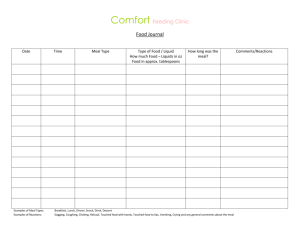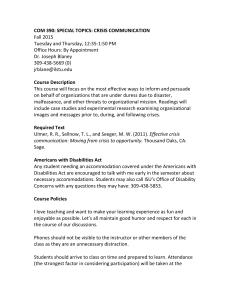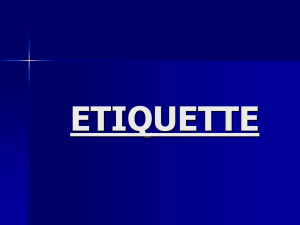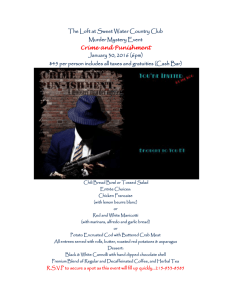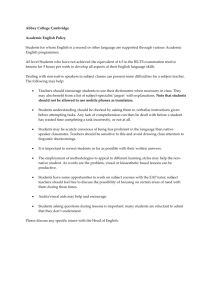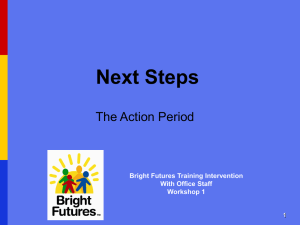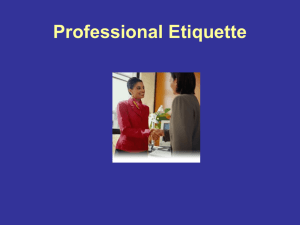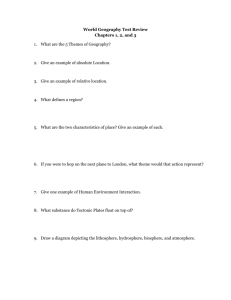Read more about this poll
advertisement
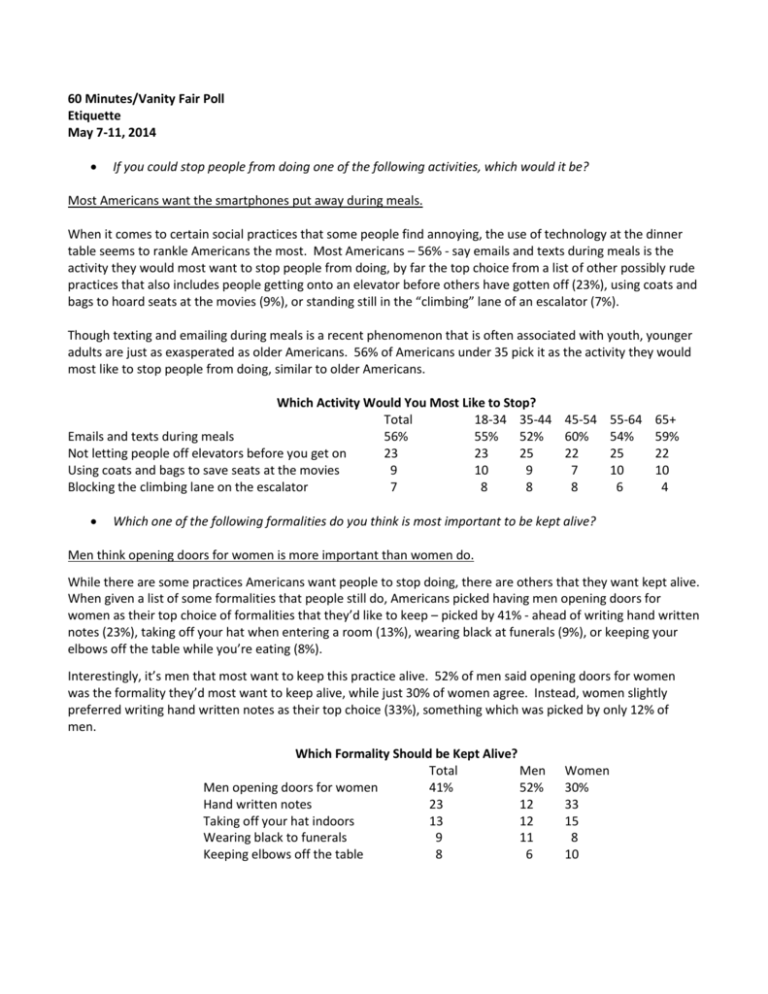
60 Minutes/Vanity Fair Poll Etiquette May 7-11, 2014 If you could stop people from doing one of the following activities, which would it be? Most Americans want the smartphones put away during meals. When it comes to certain social practices that some people find annoying, the use of technology at the dinner table seems to rankle Americans the most. Most Americans – 56% - say emails and texts during meals is the activity they would most want to stop people from doing, by far the top choice from a list of other possibly rude practices that also includes people getting onto an elevator before others have gotten off (23%), using coats and bags to hoard seats at the movies (9%), or standing still in the “climbing” lane of an escalator (7%). Though texting and emailing during meals is a recent phenomenon that is often associated with youth, younger adults are just as exasperated as older Americans. 56% of Americans under 35 pick it as the activity they would most like to stop people from doing, similar to older Americans. Which Activity Would You Most Like to Stop? Total 18-34 35-44 45-54 55-64 Emails and texts during meals 56% 55% 52% 60% 54% Not letting people off elevators before you get on 23 23 25 22 25 Using coats and bags to save seats at the movies 9 10 9 7 10 Blocking the climbing lane on the escalator 7 8 8 8 6 65+ 59% 22 10 4 Which one of the following formalities do you think is most important to be kept alive? Men think opening doors for women is more important than women do. While there are some practices Americans want people to stop doing, there are others that they want kept alive. When given a list of some formalities that people still do, Americans picked having men opening doors for women as their top choice of formalities that they’d like to keep – picked by 41% - ahead of writing hand written notes (23%), taking off your hat when entering a room (13%), wearing black at funerals (9%), or keeping your elbows off the table while you’re eating (8%). Interestingly, it’s men that most want to keep this practice alive. 52% of men said opening doors for women was the formality they’d most want to keep alive, while just 30% of women agree. Instead, women slightly preferred writing hand written notes as their top choice (33%), something which was picked by only 12% of men. Which Formality Should be Kept Alive? Total Men Men opening doors for women 41% 52% Hand written notes 23 12 Taking off your hat indoors 13 12 Wearing black to funerals 9 11 Keeping elbows off the table 8 6 Women 30% 33 15 8 10 When someone has died, do you think it’s sometimes acceptable to send a condolence note by email, or do you think it’s only acceptable to send a condolence note by regular mail? Condolences should not be electronic. Even as electronic correspondence seems to be quickly replacing handwritten letters, there is one area at least where most Americans think only picking up a pen and paper will suffice. While 35% of Americans think it is sometimes acceptable to send a condolence note by email, a majority of 60% think it’s only acceptable to send a condolence note by regular mail. Even a majority of younger Americans think only regular mail is acceptable for condolence notes, though they feel less strongly about this than older Americans. Though 55% of Americans under 35 think only regular mail is acceptable, this rises to 77% for those 65 and older. Only regular mail Email is acceptable What is an Acceptable Condolence Note? Total 18-34 35-44 45-54 55-64 65+ 60% 55% 51% 59% 62% 77% 35 40 41 35 34 21 When you have a question about proper etiquette, which one of the following do you usually consult with the most? When it comes to etiquette, many Americans say “To thine own self be true”. When Americans have a question about proper etiquette, many Americans trust themselves over an outside authority. In fact, consulting their own gut instinct was the top choice from a list of five – picked by 39%. Family members were next in line, with 19% first consulting their mother or grandmother, and 17% consulting their spouse or significant other. 11% look up what to do online first, 10% go to a friend, while just 3% still consult the writings of Emily Post - the American author who wrote the book (or books) on etiquette and manners in the United States. Older Americans are more comfortable than younger Americans trusting their own gut instinct on matters of etiquette. While 30% of Americans under 35 trust their gut first, nearly as many – 29% - go to their mother or grandmother for advice first. In contrast, 50% of Americans 65 and older trust their own gut instincts first. Who do You Consult with about Proper Etiquette? Total 18-34 35-44 45-54 Your own gut instinct 39% 30% 33% 39% Your mother/grandmother 19 29 23 21 Your spouse/significant other 17 13 20 19 The internet 11 17 11 7 A friend 10 6 13 10 Emily Post 3 1 -3 55-64 47% 9 18 12 8 5 65+ 50% 7 18 4 13 5 Which one of the following questions is the rudest when responding to an online dating profile? Asking someone their income is ruder than asking about STDs when it comes to online dating. When responding to an online dating profile, is there anything ruder than asking someone if they have a sexually transmitted disease? Apparently so: 51% of Americans think asking someone how much money they make is the rudest question one could ask, far ahead of asking about STDs (26%), from a list that also includes asking if they have any other pictures (9%) or if they are married (9%). Rudest Question When Responding to an Online Dating Profile Total 18-34 35-44 45-54 55-64 65+ How much money do you make? 51% 49% 53% 49% 53% 54% Do you have any STDs? 26 29 27 29 22 18 Do you have any other pictures? 9 11 10 11 6 5 Are you married? 8 8 5 6 9 12 Which one of the following is the worst way to break up with someone? Facebook is the worst way to break up with someone. There may be no good way to break up with someone, but just over half of all Americans think Facebook may be one of the worst. 51% of Americans say using a Facebook post to break up with someone is worse than some other possibly inconsiderate methods, such as a sticky note (15%), a text or instant message (14%), a phone call (8%), or email (7%). Men and women both pick Facebook as the worst way to break up with someone, though women (57%) are far more likely to say so than men (44%). And younger Americans are particularly alarmed at the prospect of being dumped on Facebook: two-thirds (66%) pick it as the worst way to break up with someone. Worst Way to Break Up with Someone Total 18-34 35-44 A Facebook post 51% 66% 53% A sticky note 15 12 17 Text or instant message 14 12 18 Over the phone 8 5 5 Email 7 4 2 45-54 53% 14 14 7 9 55-64 46% 17 14 10 6 65+ 26% 17 15 15 18 What does the phrase “getting there on time” usually mean to you? Being on time means being early. To most Americans, being there on time requires more than just showing up right on the dot. Instead, 70% of Americans say that the phrase “getting there on time” really means arriving a few minutes early. Just 26% say it means what it sounds like it does - that is, arriving precisely on time, while very few – just 3% - give themselves the extra leeway of saying it means arriving no more than 30 minutes late. Majorities of both men and women think arriving on time means getting there early, though men are more steadfast about this than women. 79% of men think getting there on time means arriving a few minutes early, compared to 63% of women. What Does “On Time” Mean to You? Total Men Arriving a few minutes early 70% 79% Arriving precisely on time 26 19 No more than 30 minutes late 3 3 Women 63% 34 4 When attending a formal dinner, should your bread plate be to your right or left, or don't you know enough to say? Where does the bread plate go? According to tradition (as well as the Emily Post Institute) the bread plate goes on the left hand side above the forks, though most Americans don’t know this. When asked left or right, Just 29% of Americans can correctly identify the proper placement of the bread plate when setting a formal dinner – 18% pick the right side, and 51% admit they just don’t know. Women (36%) are more likely than men (23%) to know the correct placement of the bread plate, though majorities of both men and women don’t answer this correctly. Older Americans do better than younger Americans: 43% of Americans over 65 know the bread plate goes on the left, compared to just 20% of Americans under the age of 35. On the left On the right Don’t know Where Does the Bread Plate Go? Total 18-34 35-44 29% 20% 26% 18 19 12 51 61 59 45-54 30% 16 51 55-64 37% 23 39 65+ 43% 18 38 Which one of the following annoys you the most when you go out to eat? Americans to waiters: “Let me eat my food!” Americans may not know where the bread plate should be located, but many do know what they find most annoying about waiters when they dine out. The top two choices from a list of four involves being interrupted while they eat: 42% say having the waiter ask if they’re still working on that when they haven’t finished eating is the most annoying , while 34% pick having the waiter ask how their meal is just when they begin to chew. Far fewer seem most annoyed by the waiter telling their name and being too chummy (9%), or telling them the specials instead of handing out a printed list (8%). Most Annoying thing Waiters Do Total Asking “Are you still working on that?" when you are 42% Asking how your meal is when you’ve just to chew 34 Being too chummy 9 Telling you the specials instead of a printed list 8 Men 37% 38 10 8 Women 46% 31 9 9 When the check comes after dining out with friends and your meal costs less than others, do you usually agree to split the check evenly, or do you usually suggest dividing up the check based on how much each person’s meal costs? Order the appetizer when eating out with friends. You might want to get the appetizer and the expensive entrée the next time you dine out with friends. 60% of Americans say that when dining out with friends they are more likely to agree to split the check evenly even if their dish costs less than others. Just 35% say they usually suggest dividing up the check based on how much each person’s meal costs. Income makes a bit of a difference however. While 70% of Americans earning over $100,000 a year feel they can afford to be magnanimous and help subsidize the cost of their friends’ food when dining out, this percentage drops to 59% of those earning less than that. When Eating Out and Your Meal Costs the Least, Do You…? Total Under $100K $100K+ Agree to split the check evenly 60% 59% 70% Suggest dividing the check up 35 34 27 Have you ever given anyone the middle finger? Most Americans have “flipped the bird”. The extension of one’s middle finger as symbol of insult – sometimes called “giving the finger” or “flipping the bird” – supposedly hails back from the time of ancient Greece. 64% of Americans say they have partaken of this ancient tradition at some point in their lives, including 72% of men and 56% of women. But though the practice dates back to ancient times, it appears to be on the rise among Americans today. While just 40% of Americans 65 and over say they have given the finger, this rises to 69% of Americans under the age of 65. Have You Ever Given Anyone “The Middle Finger”? Total Men Women 18-64 65+ Yes 64% 72% 56% 69% 40% No 36 28 44 31 59 ____________________________________________________________________________ This poll was conducted by telephone from May 7-11, 2014 among 1,000 adults nationwide. Data collection was conducted on behalf of CBS News by Social Science Research Solutions of Media, PA. Phone numbers were dialed from samples of both standard land-line and cell phones. The error due to sampling for results based on the entire sample could be plus or minus 3 percentage points. The error for other subgroups may be higher. Interviews were conducted in English and Spanish. This poll release conforms to the Standards of Disclosure of the National Council on Public Polls. 60 Minutes/Vanity Fair Poll Etiquette May 7-11, 2014 VF-01. When you have a question about proper etiquette, which one of the following do you usually consult with the most? Your own gut instinct Your mother or grandmother Your spouse or significant other The internet A friend Emily Post Don’t know/no answer VF-02. Which one of the following formalities do you think is most important to be kept alive? Men opening doors for women Writing hand written notes Taking your hat off when you enter a room Wearing black to funerals Keeping elbows off the table during meals Don’t know/no answer VF-03. Men % 52 12 12 11 6 8 Women % 30 33 15 8 10 5 Total % 56 23 9 7 4 18-34 % 55 23 10 8 4 35-44 % 52 25 9 8 6 45-54 % 60 22 7 8 2 55-64 % 54 25 10 6 5 65+ % 59 22 10 4 4 When someone has died, do you think it’s sometimes acceptable to send a condolence note by email, or do you think it’s only acceptable to send a condolence note by regular mail? Only regular mail Email acceptable Don’t know/no answer VF-05. Total % 41 23 13 9 8 6 If you could stop people from doing one of the following activities, which would it be? People checking email or texting during meals People getting onto an elevator before others have gotten off People using coats and bags to save lots of seats at a movie theater People standing still in the "climbing" lane of an escalator Don’t know/no answer VF-04. ********* TOTAL RESPONDENTS *********** ************ Age **************** Total 18-34 35-44 45-54 55-64 65+ % % % % % % 39 30 33 39 47 50 19 29 23 21 9 7 17 13 20 19 18 18 11 17 11 7 12 4 10 6 13 10 8 13 3 1 -3 5 5 2 2 1 1 1 4 60 35 5 55 40 5 51 41 8 59 35 6 62 34 4 77 21 2 Which one of the following questions is the rudest when responding to an online dating profile? Do you have any other pictures How much money do you make Are you married Do you have any STDs Don’t know/no answer 9 51 8 26 7 11 49 8 29 3 10 53 5 27 4 11 49 6 29 5 6 53 9 22 11 5 54 12 18 12 VF-06. Which one of the following is the worst way to break up with someone? Over the phone With a text or instant message With an email With a sticky note With a Facebook post Don’t know/no answer VF-07. ********* TOTAL RESPONDENTS *********** ************ Age **************** Total 18-34 35-44 45-54 55-64 65+ 8 5 5 7 10 15 14 12 18 14 14 15 7 4 2 9 6 18 15 12 17 14 17 17 51 66 53 53 46 26 5 2 3 2 8 9 What does the phrase “getting there on time” usually mean to you? Arriving a few minutes early Arriving precisely on time Arriving no more than 30 minutes late Don’t know/no answer Total % 70 26 3 * Men % 79 19 3 * Women % 63 34 4 -- 37 38 10 8 8 46 31 9 9 5 *Less than 0.5% VF-08. Which one of the following annoys you the most when you go out to eat? The waiter asking “Are you still working on that?” when you haven’t finished eating The waiter asking how your meal is just when you begin to chew The waiter telling you their name and being really chummy The waiter telling you the specials instead of giving you a printed list Don’t know/no answer VF-09. When attending a formal dinner, should your bread plate be to your right or left, or don't you know enough to say? Left Right Don’t know No answer VF-10. 42 34 9 8 6 Total % 29 18 51 2 ************ Age **************** 18-34 35-44 45-54 55-64 65+ % % % % % 20 26 30 37 43 19 12 16 23 18 61 59 51 39 38 1 3 3 1 2 When the check comes after dining out with friends and your meal costs less than others, do you usually (agree to split the check evenly, or do you usually suggest dividing up the check based on how much each person’s meal costs? Agree to split the check evenly Suggest dividing the check up Don’t know/no answer Total % 60 35 6 ****** Income ******* Under $100K $100K+ % % 59 70 34 27 6 3 VF-11. Have you ever given anyone the middle finger? ********* TOTAL RESPONDENTS *********** *** Gender *** *** Age *** Total Men Women 18-64 65+ % % % % % 64 72 56 69 40 36 28 44 31 59 * 1 * -1 Yes No Don’t know/no answer *Less than 0.5% Total Respondents: 1,000
